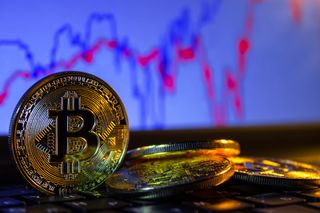What is the value of Bitcoin?
Why is Bitcoin worth anything and what does it mean for business?

Bitcoin had a truly monumental year in 2017, and despite gains in other alt-currencies, it remains the most well funded and widely known cryptocurrency in existence. However, despite its mainstream media attention and unprecedented surge in value, there's still confusion as to exactly how Bitcoin gets its value.
Bitcoin continues to enjoy impressive growth, managing to hit just over $19,000 in December, which, while being great news for investors, left outsiders scratching their heads as to why it's worth anything.
It's important to remember that Bitcoin represents an entirely new generation of currency that's quite unlike anything that's come before. Unlike traditional currencies, which are tied to national economies, Bitcoin has no tangible value - it's worth precisely what the last person was willing to pay for it.
As a result, figuring out its worth is incredibly difficult, which is why Bitcoin is known as one of the most volatile assets you can trade in and has drawn countless warnings from the finance industry about the likelihood of losing your money.
For short-term traders, that's arguably true. If you bought one Bitcoin on 16 December it would have been worth $19,324. Just under a month later that Bitcoin is now worth $15,000. However, those lucky enough to have invested early would have seen their Bitcoins appreciate in value by 1000% over the past year.
A brief history
To understand its worth, it's important to look at where it came from. Although officially founded in 2008, Bitcoin didn't gain economic value until October 2009, when New Liberty Standard published the first exchange rate. Under this rate, you could swap 1,309 Bitcoins for $1, calculated by dividing the dollar by the average amount of electricity required to mine for the digital currency.
In May 2010, the world's first Bitcoin purchase took place, in which a US programmer offered to pay 10,000 Bitcoins for a pizza on a trading forum, roughly valued at $25 at the time. Today, a transaction that large would be worth a little over $150 million.
Get the ITPro. daily newsletter
Receive our latest news, industry updates, featured resources and more. Sign up today to receive our FREE report on AI cyber crime & security - newly updated for 2024.
Over the next few years, Bitcoin would see steady, albeit slow, growth, eventually reaching a market cap of $1 million by 2010, valued at $0.50 BTC.
The biggest breakthrough for Bitcoin in the UK came in 2014, when HMRC classified the currency as assets or private money. This meant that the mining or trading of bitcoins was not subject to VAT and marked the world's first ruling on the taxation of the currency.
How is price calculated?
Establishing value is a fairly difficult task when you are dealing with a cryptocurrency. Traditional currencies derive their value from being the only accepted legal tender currently circulating within an economy to engage in commerce in the UK, you need to deal in pounds sterling. Likewise, commodities are often based on their industrial value, or, in the case of gold, their properties and desirability.
Bitcoin has none of that and is popular precisely because of the lack of central regulation and its apparent immunity to government interference. In effect, Bitcoin goes back to the roots of all money and commodities, worth only how much someone is willing to pay for it. The exchange of Bitcoins is essentially a bartering process between a seller and a buyer trying to find a common ground. The current dollar price of one Bitcoin is calculated by the average of these transactions across the various exchanges.
Why is Bitcoin worth anything?
Bitcoin fundamentally relies on a theory known as the 'network effect'. Much like social media networks today, its value is derived from the number of people using the platform. The more people mining and trading Bitcoins, the easier it is to secure and transfer. This also results in a higher market cap, or the total value of all bitcoins in circulation.
The popularity of Bitcoin means today the market cap is sat at just over $254 billion, or 187 billion - which gives it a higher market cap than the British Pound.
Today's Bitcoin market attracts a range of different types of investor. Many are undoubtedly newcomers looking to make a quick return on sudden value hikes, while others see the longer term value of using the digital currency as an alternative to local currencies.
How can I spend Bitcoin?
Although Bitcoin has yet to replace day-to-day currency, it's slowly being adopted as an accepted form of payment for a wide range of goods and services. Although it's still considered a niche payment method, it's now possible to use Bitcoins to pay for almost anything grocery shopping, housing, subscription TV, restaurant bills, and even education through online seminars.
Microsoft, Dell Technologies, and retail giants Newegg and Overstock were some of the first companies to adopt the currency as a valid payment option, although this is typically restricted to US customers. A handful of airline companies such as AirBaltic and Air Lituanica are also accepting Bitcoins, as well as some UK-based sites like Honest Brew and Theatre Tickets Direct.
However we're still some way off from Bitcoin becoming as synonymous with online payments as, say, Paypal, and by far the easiest way to spend the currency is by buying gift cards. UK-based Gift Off, for example, allows customers to buy vouchers for Marks & Spencer, Starbucks, Nike, and other leading high street names, as well as online stores such as Amazon.
What does this mean for business?
Although 31 billion sounds a lot, in the grand scheme of things this is very little. The total value of gold reserves is estimated to exceed $7 trillion alone. Yet this isn't the most problematic limitation of the currency, as in order to function as a day-to-day business tool, it would require a technical overhaul.
Bitcoin is only capable of processing seven transactions per second, as the protocol behind the currency limits block sizes to 1MB compare that to traditional services such as Visa, which can handle thousands. As the network grows, limitations such as these will begin become more accentuated.
There is also the issue of finite supply. Bitcoins are created each time a user solves a mathematical problem, which in turn creates a 'block'. The discovery of blocks is adjusted over time, and the number of bitcoins created is halved every 210,000 blocks, or every four years. This means that the total number of bitcoins in circulation is expected to cap at 21 million, which at today's valuation is a market cap of $52 billion (41 billion). In other words, for Bitcoin to have the equal overall value of gold, it would need to increase from the 1,801 it's worth today, to just over 270,000.
To really see Bitcoin flourish as a platform for digital currency, it will need to see massive growth, eclipsing even its most recent gains. The likelihood of that happening depends entirely on the network bubble, which is likely going to pop sooner rather than later.
Should it be seen as a commodity?
There exists an on-going debate as to whether Bitcoin is a currency or a commodity. In 2015 the US Commodity Futures Trading Commission (CFTC) officially designated Bitcoin as a commodity, yet Bitcoin doesn't neatly fit into either category and instead may be a mix of both. The way Bitcoin is traded today is akin the way gold and silver originally circulated both as a valuable physical good and as direct payment.
Yet the difficulty in categorising Bitcoin lies in the source of its value. The trade of Bitcoin is inexorably tied to the network effect and is only worth as much as it is today because people currently want to use it. It lacks the intrinsic value of gold, silver, or oil and lacks the characteristics that underpin them as reliable trading items, such as industrial value or universal appeal.
We have never seen anything quite like Bitcoin, and it's still far too early to tell how popular or impactful Bitcoin will be on the world's economy. Recent growth spurts are a welcome sign, but it still has a long way to go.
Dale Walker is the Managing Editor of ITPro, and its sibling sites CloudPro and ChannelPro. Dale has a keen interest in IT regulations, data protection, and cyber security. He spent a number of years reporting for ITPro from numerous domestic and international events, including IBM, Red Hat, Google, and has been a regular reporter for Microsoft's various yearly showcases, including Ignite.





